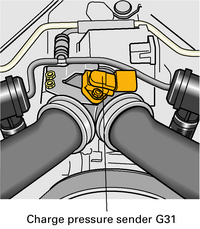Manifold air pressure: Difference between revisions
| Line 14: | Line 14: | ||
At atmospheric pressure (14.7 psi or 1.01 bar at sea-level), the |
At atmospheric pressure (14.7 psi or 1.01 bar at sea-level), the |
||
voltage is approx. 2.5 volts. |
voltage is approx. 2.5 volts. |
||
| ⚫ | |||
| ⚫ | |||
The signal is used for charge pressure control. |
The signal is used for charge pressure control. |
||
| Line 24: | Line 20: | ||
charge pressure so that it can take countermeasures if the maximum permissible |
charge pressure so that it can take countermeasures if the maximum permissible |
||
pressure is exceeded. |
pressure is exceeded. |
||
| ⚫ | |||
| ⚫ | |||
===Substitute function and self-diagnosis=== |
===Substitute function and self-diagnosis=== |
||
Revision as of 22:18, 11 November 2006
Charge pressure sender G31
The charge pressure sender is located upstream of the throttle valve control part.
The Motronic supplies the sender with a voltage of 5 volts and earth. The signal which the sender generates is a pressure-proportional voltage ranging from 0 to 5 volts.
At atmospheric pressure (14.7 psi or 1.01 bar at sea-level), the voltage is approx. 2.5 volts.
The signal is used for charge pressure control.
The Motronic also needs information on charge pressure so that it can take countermeasures if the maximum permissible pressure is exceeded.
The absolute maximum pressure reading is approximately 22.45 psi (1.55 bar). Pressure readings above 1.5 bar (21.8 psi) may cause throttle cut.
Substitute function and self-diagnosis
If sender G31 fails, the charge pressure is controlled via the characteristic curve (engine speed-dependent). This will result in a deficiency of engine power.
References
- AW discussion on MAP sensor function
